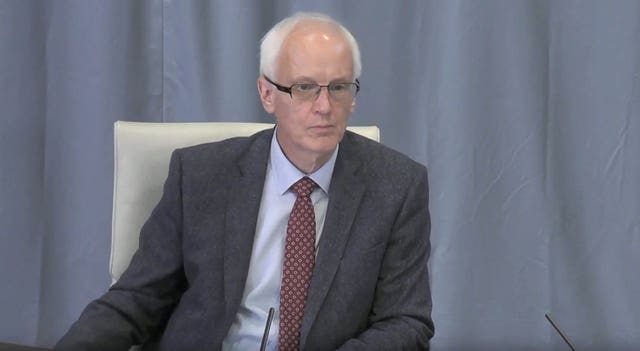
Children with severe haemophilia on a home treatment programme were treated with commercial blood products because a doctor thought the supply was more reliable, an inquiry has heard.
The Infected Blood Inquiry heard the programme was introduced by Dr Michael Willoughby, who was in charge of haemophilia patients at the Royal Hospital for Sick Children (RHSC), Yorkhill, Glasgow, in the late 1970s and early 1980s.
It was said this made it possible for children to be treated for bleeds at home, particularly if they lived far from the hospital.
Thousands of patients across the UK were infected with HIV and hepatitis C – which was previously known as non-A, non-B hepatitis – through contaminated blood products in the 1970s and 1980s.
About 2,400 people died in what has been labelled the worst treatment disaster in the history of the NHS.
Dr Anna Pettigrew, a clinical assistant in the haematology department at the RHSC from 1980-1989, gave evidence to the UK-wide inquiry remotely on Monday.
Jenni Richards QC asked whether she had any discussion with Dr Willoughby about why he chose to use commercial product rather than NHS product for the home therapy programme.
She replied: “He said when he was starting home therapy the Scottish National Blood Transfusion Service (SNBTS) could not supply sufficient or reliable amounts for him to use for his home therapy programme.”
She added: “I was led to believe by him that his main concern was having a reliable supply.”

Dr Pettigrew said she was not involved in any decisions around procurement.
Ms Richards asked what her understanding was of the relative safety of commercial product compared to SNBTS product.
Dr Pettigrew, who worked at Glasgow Royal Infirmary (GRI) before taking up her post at Yorkhill, replied: “I think I was probably aware that the commercial product carried more risks of hepatitis B.
“I knew it was from a pool of donors but I was not aware of pool sizes and never worked in blood transfusion and also the fact that we did not use it at the GRI.
“I wondered if there was increased risk from commercial concentrate.”
The inquiry, before chairman Sir Brian Langstaff, continues.


Comments: Our rules
We want our comments to be a lively and valuable part of our community - a place where readers can debate and engage with the most important local issues. The ability to comment on our stories is a privilege, not a right, however, and that privilege may be withdrawn if it is abused or misused.
Please report any comments that break our rules.
Read the rules here